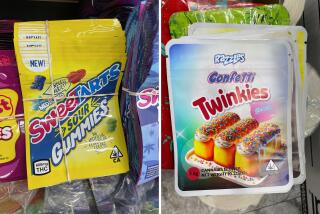Store Checks Show Half Sold Tobacco to Minors
In the first test of the city’s Tobacco Enforcement Program, nearly half the merchants investigated in a two-day period last month illegally sold cigarettes to minors, City Atty. James K. Hahn said Monday.
The compliance checks show that underage smokers may find it easier to purchase tobacco products in Los Angeles than anywhere else in the state, Hahn told a news conference outside San Fernando High School in Pacoima.
Out of 30 northeast San Fernando Valley merchants investigated in mid-January, 14 were found in violation, said Hahn, a mayoral candidate.
The state average for vendors found selling tobacco to minors is 23%, according to Nora Manzanilla, administrative coordinator of the city’s Tobacco Enforcement Program.
Selling tobacco products to minors is illegal under the 1994 state Stake Act and may carry fines up to $6,000, depending on the number of offenses in a five-year period. The cases of the 14 vendors found in the recent compliance checks will be handled by the state Department of Justice, Hahn said.
Many of the 30 merchants also violated two city ordinances that are part of Hahn’s enforcement program. One requires vendors to have a permit to sell tobacco products. Permits are free but must be renewed annually. The other ordinance prohibits self-service displays of tobacco products.
Though the compliance checks were conducted over just two days, Hahn said the results indicate the enforcement program is proving useful.
“What was missing was this enforcement component,” he said of the city’s efforts to crack down on tobacco sales to minors.
Last spring, when the ordinance was passed, Los Angeles City Councilman Nate Holden cast the single dissenting vote because the penalties were not severe enough to dissuade vendors from making illegal sales, he said at the time.
In addition to the state penalties, violation of the city ordinances is a misdemeanor that may carry fines up to $1,000 or 60 days in jail, Hahn said. If a tobacco seller violates any state or city law within any five-year period, the first violation draws a warning, the second a 30-day permit suspension, the third a 90-day permit suspension and a fourth a one-year permit suspension.
“People make a lot of money selling cigarettes,” Hahn said. “I think stores will want to compete and keep their customers.”
But in order to revoke a permit, vendors must have a permit. Last August, 21,000 merchants received brochures informing them they had 30 days to apply for a permit. To date, 3,000 permits have been issued. Hahn said the permits will be used to create a comprehensive database of tobacco sellers and will help track nontraditional vendors such as hair salons and restaurants.
The $1.5-million Tobacco Enforcement Program was funded by a partial settlement from the city’s 1997 lawsuit against R.J. Reynolds Tobacco Co. for advertising to minors. The funding will pay for 700 compliance checks between now and October, Hahn said.
Underage smoking in California has declined in recent years. The rate among 12- to 17-year-olds dropped from 10.7% in 1998 to 6.9% in 1999, according to the state Department of Health.
More to Read
Sign up for Essential California
The most important California stories and recommendations in your inbox every morning.
You may occasionally receive promotional content from the Los Angeles Times.










